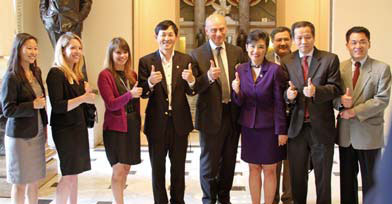US apologizes for 130-year-old law
Updated: 2012-06-19 12:09
By Tan Yingzi in Washington (China Daily)
|
||||||||
|
US Congresswoman Judy Chu (fourth from the right) and NCCA President Haipei Shue (second from the right) are celebrating with their colleagues on Monday in Washington. Sun Chenbei / China Daily |
The US House of Representatives on Monday unanimously expressed regret for the passage of discriminatory laws against Chinese immigrants to the United States, particularly the Chinese Exclusion Act of 1882.
Thanks to a grass-roots campaign of Chinese-American communities across the country, the vote marked the first time the House acknowledged the laws' far-reaching injustice. It followed a similar apology approved by the US Senate in November.
Representative Judy Chu, a California Democrat who co-sponsored the bill, called Monday's passage a "breakthrough" in the "historic" effort to acknowledge the harm done by exclusion law 130 years after its adoption.
"The trauma of the exclusion laws left a permanent scar upon generations of Chinese-Americans, splitting apart families and disenfranchising many," Chu told her colleagues before the vote. "Like all Chinese-Americans, my own grandfather did not have the legal right to become a naturalized citizen, and had to carry papers on him at all times or else be deported."
The legislation "formally regrets the passage of legislation that adversely affected people of Chinese origin in the US because of their ethnicity, and recognizes that the US was founded on the principle that all persons are created equal", she added.
But the vote is not the end of the story, the congresswoman said. She is thinking about how to educate all Americans about the exclusion laws and their legacy.
"What I would like to do is to ensure that there are more educational efforts in our curriculum for K-12 schools all across the country, because something like this should be known to everybody and we should learn a lesson from it," Chu told China Daily after the House vote.
The Chinese Exclusion Laws were passed by Congress between 1879 and 1904. The laws violated the civil rights and liberties of Chinese immigrants by severely restricting their status and movement in the country, barring them from becoming US citizens, and for a decade prohibited Chinese laborers from entering the US.
Although the laws were repealed in 1943 once China had become a US ally during World War II, Congress has never formally acknowledged that they singled out and ostracized an ethnic group, an abrogation of the United States' founding principles.
Now, more than 4 million Chinese-Americans live in the US and their contributions have long been recognized by the broader society.
Two years ago, a petition signed by about 160 Chinese-American organizations was delivered by hand to Chu, the first Chinese-American woman elected to Congress. It urged lawmakers on Capitol Hill to formally apologize for the acts, the first major restriction on immigration to the US.
A working group, the 1882 Project, was later set up to push for passage of the House and Senate resolutions. The nonpartisan, grass-roots group was led by the Chinese-American Citizens Alliance, the Committee of 100 and the National Council of Chinese Americans.
Because Japanese and Filipinos were also affected by the laws, the Japanese American Citizens League also joined the effort.
Haipei Shue, president of the NCCA, said passage of the legislation in both chambers is a "milestone" in Chinese American history, but more must be done to educate the public about the past.
tanyingzi@chinadailyusa.com
(China Daily 06/19/2012 page1)

 Relief reaches isolated village
Relief reaches isolated village
 Rainfall poses new threats to quake-hit region
Rainfall poses new threats to quake-hit region
 Funerals begin for Boston bombing victims
Funerals begin for Boston bombing victims
 Quake takeaway from China's Air Force
Quake takeaway from China's Air Force
 Obama celebrates young inventors at science fair
Obama celebrates young inventors at science fair
 Earth Day marked around the world
Earth Day marked around the world
 Volunteer team helping students find sense of normalcy
Volunteer team helping students find sense of normalcy
 Ethnic groups quick to join rescue efforts
Ethnic groups quick to join rescue efforts
Most Viewed
Editor's Picks

|

|

|

|

|

|
Today's Top News
Health new priority for quake zone
Xi meets US top military officer
Japan's boats driven out of Diaoyu
China mulls online shopping legislation
Bird flu death toll rises to 22
Putin appoints new ambassador to China
Japanese ships blocked from Diaoyu Islands
Inspired by Guan, more Chinese pick up golf
US Weekly

|

|







